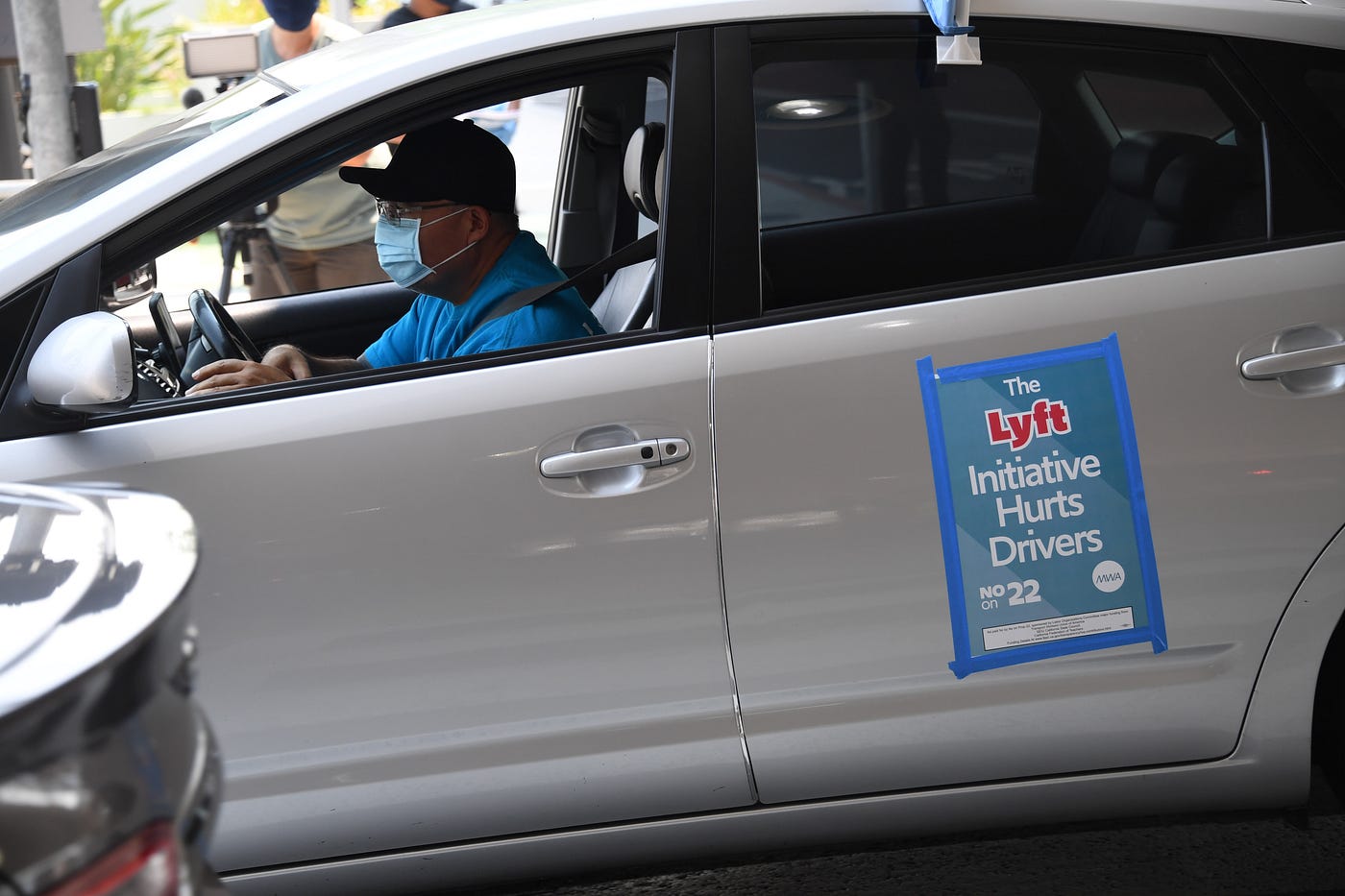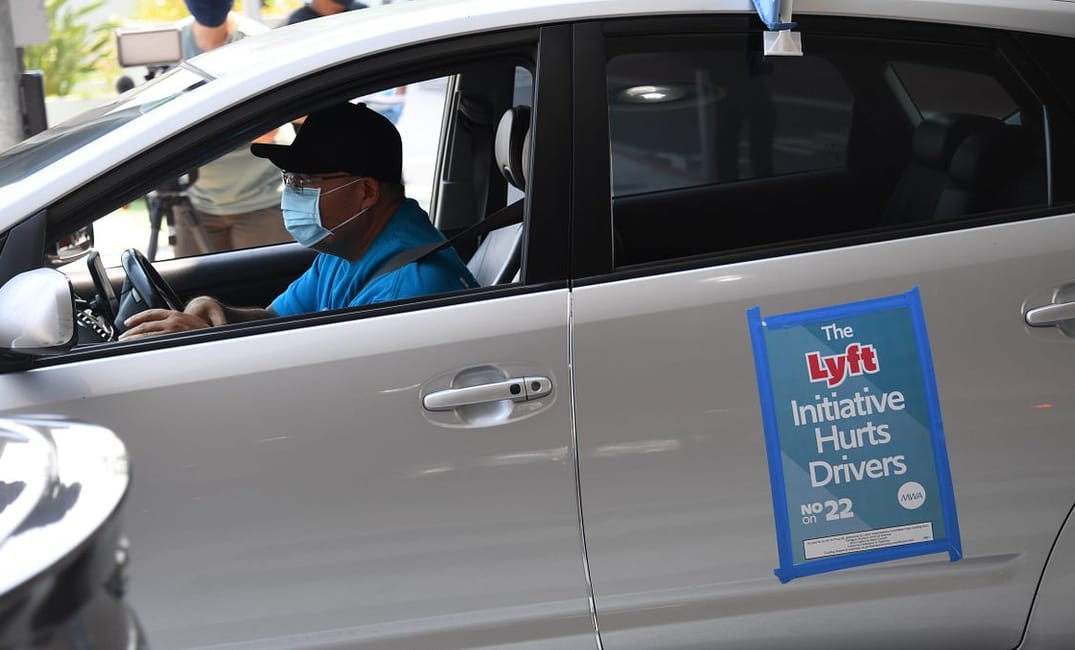
$200 million.
That’s what ride-share giants Uber and Lyft, along with food delivery companies like DoorDash, Postmates, and Instacart, spent on Proposition 22 in California — the most money ever doled out to advocate for a measure in state history.
And it worked. On Tuesday, voters carried some of the world’s most powerful tech companies to victory, with 58% casting votes in favor of Prop 22. That means the businesses can now keep their gig workers classified as independent contractors, and in turn, avoid giving them basic rights and benefits that full-time employees receive, like health insurance and paid sick leave.
The results will have massive ramifications for disadvantaged gig drivers in California, as well as for workers across the country. Importantly, it also opens the door for billionaire app companies to influence even more labor laws moving forward.
“Uber and Lyft figure if they win in California they can win political fights in the rest of the states, and probably Congress,” economist Robert Reich told CNN.
Let’s be clear: Most Californians didn’t vote for Prop 22 because they want fewer benefits for gig workers. Most did because of the millions of dollars spent on shady tactics misleading them about what the law actually means.
Prop 22 has been controversial since Uber and Lyft introduced it as a way to combat California’s AB-5 law that went into effect on January 1, 2020. Under AB-5, workers who performed tasks within a company’s regular business — and did not operate their own companies — were required to be treated as employees and get associated benefits. Its intent: to ensure workers weren’t exploited by gig companies.
Tech companies filed several lawsuits over the law, but judges sided with the state again and again.
So as a last-ditch attempt, the tech companies came up with Prop 22, which would exempt gig workers from AB-5 rules and allow them to continue to be labeled as independent contractors without full benefits. They made some concessions, like offering a minimum earnings guarantee based on “engaged time” when a driver is fulfilling a ride or delivery request (but that doesn’t include the time they spent waiting for a job) and health insurance stipends for some drivers (but no health coverage guarantee).
If the companies are only operating somewhat successfully because they are exploiting drivers, should they even be operating?
Yes on 22 proponents argued that labeling gig workers as employees would be financially impossible for companies, who threatened to leave the state or dramatically decrease the number of drivers it could employ. They argued drivers liked the flexibility to do as many hours as they want, whenever they wanted. They warned costs would be passed to customers.
But if the companies are only operating somewhat successfully because they are exploiting drivers, should they even be operating? It’s been clearly documented that drivers often end up making less than California’s minimum wage and struggle to make ends meet.
Opponents of 22 — including Joe Biden, Kamala Harris, and Bernie Sanders—argued it would strip workers of benefits afforded by AB-5, like minimum wage, overtime pay, workers’ compensation, unemployment insurance, health coverage, paid sick leave, and the right to form a union. They also warned that if passed, it would be nearly impossible for the state’s legislature to overturn the measure since it would require a seven-eighths majority to amend it.
Now, here we are. But how exactly did we get here?
Lots and lots of money. And dirty political moves.
Over the course of the year, Yes on 22 has spent millions to influence voters often through shady tactics. Companies used their own apps to tell workers and customers how to vote; it was even documented that Uber drivers had to hit “Yes on Prop 22” or “OK” on campaign messages in order to pick up a ride.
Then came the ads which flooded the state, warning that drivers would lose the flexibility to work whenever and wherever they choose if it didn’t pass. They paid drivers big bucks to appear in the ads in favor of the measure. The ads made it seem like Yes on Prop 22 was the progressive choice benefiting drivers rather than the companies. Uber and Lyft even threatened to leave California if it didn’t pass.
There were also fake “progressive mailers” sent to Southern California voters from made-up organizations like “Feel the Bern, Progressive Voter Guide,” “Council of Concerned Women Voters Guide” and “Our Voice, Latino Voter Guide.”
The political fliers had no information on who paid for the literature. SFGate talked to Renee Nahum, a Los Angeles consultant associated with the mailers, who confirmed to them that she received $20,000 for her work on the “Council for Concerned Women Voters Guide,” but “when asked to clarify who paid for the mailer, she ended the conversation, saying she had to take an important call.”
California state Assemblywoman Lorena Gonzalez told The Hill that Proposition 22 tactics like buying fake groups and tying them to progressives like Bernie Sanders were “dirtier than I’ve ever seen before.”
“This is historic spending by any side on an initiative, and not historic by California standards; it’s historic nationally,” Gonzalez said during a press conference. “When you think about how much these companies put into the initiative process to simply write their own rules, this is a new path that has been chosen by these Silicon Valley billionaire corporations, and it should alarm all of us.”
Tellingly, the largest rebuke of the proposition came in San Francisco — 60% of people opposed it — the city in which these companies are based and where voters were more likely to be educated on what the companies were trying to do.
But in the end, money in politics won. Even in liberal California, if you spend enough and play dirty enough — you’ll probably get what you want.







